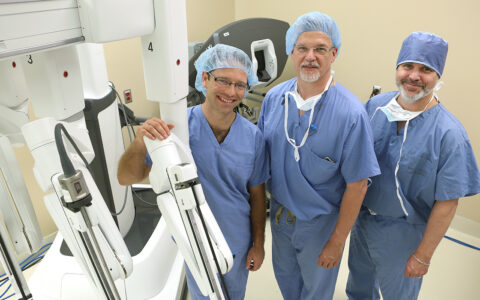Patient regret over choices related to treatment of localized prostate cancer has been the focus of a recent subanalysis of data from CEASAR (Comparative Effectiveness Analysis of Surgery and Radiation for Localized Prostate Cancer), which contains the survey results from more than 3,600 men in the United States treated between 2010 and 2012.
The latest research – led by Daniel Barocas, M.D., executive vice chair in the Department of Urology at Vanderbilt University Medical Center, who has worked over the past 10 years with CEASAR founder David Penson, M.D., chair of the Department of Urology – examines associations with direct and indirect financial costs on patients who express regrets over their decision.
Barocas, Penson, and former resident Daniel D. Joyce, M.D., recently presented their findings at the annual meeting of the American Urological Association.
CEASAR’s Aim
The broad goal the CEASAR project is to compare available management options with respect to survival outcomes, cancer recurrence, and how the disease and its treatment have affected quality of life and finances, Barocas said.
One of the main findings of this parent study was that all of the options, even surveillance, are associated with significant declines in sexual function, but surgery is associated with more dysfunction than other options in the first 3 to 5 years.
“There seems to be clinical equipoise between surgery, radiation (including brachytherapy) and surveillance in terms of their effectiveness, particularly in the lower-risk patients,” Barocas said. “For higher-risk patients, the equipoise is between surgery and radiation.”
He says this adds up to treatment choice being highly preference-sensitive, often based on factors like risk of complications, side effect profile, cost and convenience.
The Roots of Regret
An earlier analysis by Vanderbilt urologist Christopher Wallis, M.D., showed that 13 percent of men expressed treatment regret. This was lowest for active surveillance (7 percent) and radiation (11 percent), and highest for surgery (16 percent).
“If we want less regret, we as clinicians need to pay more attention to both the primary concern over sexual function and the indirect financial burden for those with low resources.”
A deeper dive showed that patients who had poor sexual function outcomes had the most regret, and the higher regret among surgery patients was really a reflection of regret associated with poor sexual function outcome. However, while surgery leads to the highest risk of loss of sexual function, treatment-associated gaps in sexual function nearly closed after about five years.
“While the time course is different for surgery and radiation, only about half of men undergoing these treatments, who were capable of intercourse before treatment, will still have this capability five years later,” Barocas said. “I have started using this sobering statistic in patient counseling about treatment choice.”
Individualized estimates of sexual, urinary and bowel function outcomes can be calculated using the decision-making support tool developed through the CEASAR study, which helps men with localized prostate cancer match their diagnosis, priorities and expectations with treatments that may optimize clinical outcomes and satisfaction with treatment decisions.
Regret and Financial Toxicity
The latest study demonstrated that regret was also associated with the financial burden of treatment, adding to insights from other CEASAR analyses on financial toxicity.
Interestingly, it was the indirect treatment costs – categorized as “finances in general” – that were significantly associated with regret rather than direct costs, like medical bills. This suggests that indirect costs, such as time off work and travel costs, are the more burdensome for many patients.
“This makes sense when you consider that the differences in out-of-pocket expenditures for the prostate cancer treatment itself are relatively small across the options,” Barocas said.
Barocas suggests that the overarching takeaway from these combined analyses is twofold: “If we want less regret, we as clinicians need to pay more attention to both the primary concern over sexual function and the indirect financial burden for those with low resources,” he said.
He hopes that studying these associations leads to better up-front counseling about the cost of care, helping men make treatment decisions they do not later regret.




